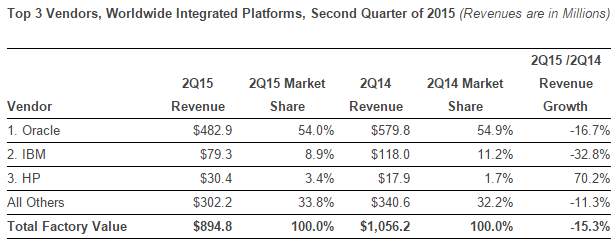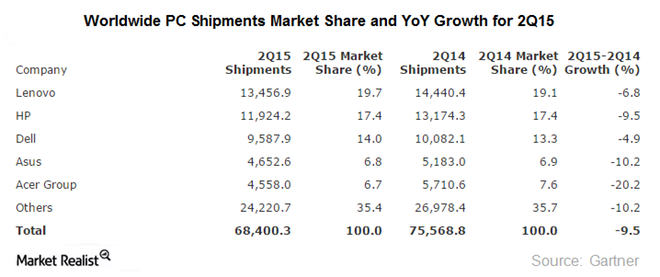Supplier Report: 10/3/2015

IBM’s long term plan of IoT, Big Data, and Analytics seems to be getting some traction even during a rough Q3. HP is fighting the ghosts of old decisions as they finalize their big split. While HP celebrates their split, EMC is telling the world they have no intention to follow that strategy.
IBM
- IBM Is Fading Back Toward Major Support
As October begins, it appears IBM is headed for its third straight lower monthly low. This current downtrend, which began on July 21 with a huge downside gap, has dropped shares nearly 20%. Late last month, the initial down leg of the post-earnings breakdown found support near $140. IBM began to rebound on Aug. 26, but the upside was well-contained. With very light bullish interest, despite the steep decline from the summer highs, the stock was unable to move past its massive Aug. 24 opening gap. Shares have been trading in a tight range since while the major indices went on to recover most of the mid-August selloff. The significant lagging action continues to weigh on Big Blue and will likely drive it lower in the near term.
http://www.thestreet.com/story/13309491/1/ibm-is-fading-back-toward-major-support.html
- IBM’s IoT Investments Are About To Pay Off
A recent IDC survey found that nearly 75% of IoT market makers are planning to deploy or have already deployed IoT systems in the next year. This proves that IoT is moving from the planning stage to the action stage, bringing the technology to life. The survey also found that of all industries tied to IoT, transportation and healthcare are furthest along, ready to deploy IoT technologies soonest.
http://seekingalpha.com/article/3536076-ibms-iot-investments-are-about-to-pay-off
- IBM acquires Meteorix to expand HR service offering
Acquiring Meteorix will make IBM one of the most experienced Workday service providers in the world, the company said, allowing it to better implement the services on behalf of customers thanks to the firm’s team of 200 consultants who specialise in delivering high-value services, while IBM will continue to focus on boosting the sales of Workday.
http://www.cloudpro.co.uk/hr/5397/ibm-acquires-meteorix-to-expand-hr-service-offering
- Analytics are better with shared storage and not scale-out, says IBM
[With] Spectrum Scale Native RAID, the cluster data is managed using higher-level erasure codes to protect against multiple disk failures while offering significant disk savings over the 3x replication found in typical HDFS installations. ESS stores data using declustered RAID6 with support for either 2-fault or 3-fault disk fault tolerance… ESS distributes the data and parity information evenly across all disks in the system [which] allows for storage rebuilds triggered by a disk failure to complete faster than traditional RAID rebuilds by distributing the work across many disks rather than just a few.
http://www.theregister.co.uk/2015/10/02/ibm_analytics_better_shared_storage_not_scaleout/
- IBM: Nanotube Breakthrough Will Create Low Power, Faster CPUs
Big Blue is claiming it can not only build carbon nanotube transistors, a claim widely acknowledged as feasible, but it can also connect the nanotubes to other processor components and circuitry, a claim no one else has made so far.
Hewlett Packard
- Autonomy’s Mike Lynch Sues Hewlett-Packard Company For $150M In Damages
The never-ending story continues!
http://www.bidnessetc.com/54054-autonomys-mike-lynch-sues-hewlettpackard-company-hpq-for-150m-in-damages-re/ - If Ray Lane hated HP’s Autonomy move so much, how did it happen?
Given Lane and Lesjak’s reticence you have to wonder how and why the deal got pushed through. Current HP chief executive and chairman Meg Whitman was on the board then, as were current directors Marc Andreessen (co-founder of Andreessen Horowitz) and Rajiv Gupta (former chairman of Delphi Automotive).
http://fortune.com/2015/09/28/how-did-hp-autonomy-deal-happen/
- HP unveils commercial PC strategy ahead of split
HP has three strategies for its personal systems business. The first is core, or delivering the best price-to-feature. The second is growth, which includes delivering innovative form factors and designs, such as two-in-one convertibles. And the last is the future and to bring disruptive technologies to market, like HP Sprout.
http://www.techradar.com/news/computing/pc/hp-unveils-commercial-pc-strategy-ahead-of-split-1305422
EMC
- EMC executive says breaking up company would be wrong thing to do
We strongly believe breaking up is the wrong thing to do. We think having a better federation is the right way to create value,” David Goulden, Chief Executive of EMC Information Infrastructure, the company’s biggest division, told the Code/Enterprise Series conference in New York.
http://www.reuters.com/article/2015/09/29/us-emc-us-breakup-idUSKCN0RT2YQ20150929
- EMC’s Most Vitriolic Competitor Is About to Go Public
So, how do EMC and Pure stack up on sales? Pure is growing fast. It hit $174 million in revenue in its Fiscal 2015 (ending Jan. 31), more than four times its $43 million top line in 2014 and an order of magnitude removed from its $6 million in 2013 revenue, according to its S-1.
Oracle
- Oracle Thumbs Nose At Shareholders On CEO Pay… Again
In an earlier article for Fortune I wrote that, reversing years of ignoring shareholder dissatisfaction with pay, Oracle announced in 2014 that it would reduce stock option grants to Ellison and to Hurd and Catz, seemingly in response to the negative Say on Pay votes. But while that did lead to a pay decrease for Ellison, this was just a miniscule 5% cut because while his options went down he received a $30 million performance stock award that almost made up for it. His pay went from $67 million to $64 million. Performance stock awards for Hurd and Catz more than made up for any reduction in stock options boosting their pay from $37 million each in 2014 to $53 million this year.
http://seekingalpha.com/article/3540186-oracle-thumbs-nose-at-shareholders-on-ceo-pay-again
- Oracle leads Integrated Platform systems with 54% share

http://www.infotechlead.com/it-statistics/oracle-leads-integrated-platform-systems-with-54-share-34617
Other
- Why Microsoft Should Fear Apple & IBM (MSFT)
For a company the size of Apple, $25 billion doesn’t seem like a lot, but it shows just how far the company has come after partnering with IBM last year and receiving heavy criticism in years past for essentially having no enterprise presence whatsoever.
http://investorplace.com/2015/10/apple-ibm-might-cause-havoc-microsoft-stock/
- Time for Hadoop to ‘grow up and get real’
http://siliconangle.com/blog/2015/09/30/time-for-hadoop-to-grow-up-and-get-real-bigdatanyc/
Photo: Aaron Burden, StockSnap
Video: How Too Many Rules at Work Keep You from Getting Things Done
News You Can Use: 9/30/2015

- 10 Intelligence Insights For Category Managers in 2015
The demand for consultancy will depend often on the complexity of the processes and interactions involved with the sector and the individual business. For instance, sectors with a highly regulated environment will often use management consultants to help implement strategies with regard to new rules or to more effectively traverse the landscape of existing regulations.
- Healthcare firms three times more likely to see data breaches
Plus, healthcare organizations are in the process of moving all their data to electronic health records, and are increasingly sharing that data with healthcare providers, clinics, insurance companies, and other industry participants. That means that criminals have a broader attack surface, and the defenders aren’t as battle-hardened as those in other industries.
- Using Cloud Computing To Manage Global Risk Of Doing Business
There has been no other technology development that has had a greater impact on the reduction of risk of operating a supply chain than cloud technology. Cloud computing has made it possible for companies to stay in touch on a real time basis with thousands of their suppliers spread all across the globe round the clock. The conventional ERP-based solutions configured to manage supply chain systems internally by inter-connecting departments within the organization do not prove to be very well positioned to handle the business processes required to manage suppliers. This is largely because supplier networks can be extremely complex and have a very large geographical footprint making them susceptible to developing faults with great ease. Supplier networks that are cloud-based are in a position to yield more options and offer additional risk management capabilities for smart companies that have switched to this technology.
http://www.hostreview.com/blog/150923-using-cloud-computing-to-manage-global-risk-of-doing-business
- The 20 jobs with the biggest salary increases this year
Nothing shocking here, but interesting to review.
http://www.fastcompany.com/3051405/the-future-of-work/the-20-jobs-with-the-biggest-salary-increases-this-year - Dropbox wants shadow IT to drive enterprise adoption
There’s one key thing that Dropbox has going for it: users inside companies are already using its product without the authorization of administrators. When the company goes to pitch a large business like News Corp. on adopting Dropbox for Business, salespeople can already point to the thousands of users of its technology inside the company.
Photo: Christopher Campbell, unsplash
Supplier Report: 9/26/2015

It was another big week for IBM and Watson with the announcement of Watson offices moving to Silicon Valley. IBM wants to be close to the disruptions and maybe cause a few. But as businesses expand into the unfamiliar world of AI, cloud, and SaaS, are they locking themselves into environment they can’t get out of easily?
As datacenters and server budgets shrink, is there an exit strategy to the externally hosted ecosystem?
IBM
- IBM Watson sharpens its cognitive skills: New APIs help make it more ‘human’
As part of this announcement, IBM also said it will expand the company’s presence in Silicon Valley and the greater Bay Area with a new Watson Hub, South of Market in San Francisco. IBM believes it will put them closer to, and increase collaboration with, the local start ups, developers, venture capital groups, established businesses and academic experts the company is currently working with to take cognitive computing into new markets. The location will also serve as the new global headquarters for IBM Commerce, a high-growth industry opportunity for IBM and Watson. The facility is scheduled to open in early 2016.
- Watson to become a huge sales engine…
http://www.bloomberg.com/news/videos/2015-09-24/ibm-s-watson-said-to-become-huge-engine-for-sales - Massachusetts gives IBM a $2.5M tax break for absolutely no reason whatsoever
IBM has promised to create 500 new jobs in exchange for its tax break. If they don’t, there will be hell to pay … or at least they’ll have to give back some of the $2.5 million.
- IBM boosts security of bring your own cloud apps
The technology helps a company discover the cloud-based apps its employees are using on their computers and mobile devices and then helps roll out a safer way of using them, without impacting productivity. Hosted on IBM Cloud, the solution scans a company’s network to find the apps being used, which are then analysed using deep threat analytics from IBM X-Force.
EMC
- Cloud takes a bite out of backup boss EMC’s top line in Q2
The storage titan saw its quarterly sales drop 16.9 per cent annually to $414.4m, and its share of the market came in more than six points lower than in the corresponding period last year. Second-placed Symantec – whose $104.5m revenue accounted for 14.4 per cent of the worldwide total – endured a decline of a comparatively modest 3.7 per cent
They added:
“Focus continues to shift away from hardware-centric, on-premise PBBA systems to hybrid/gateway systems,” she said. “The results [of this] are greater emphasis on backup and deduplication software, the ability to tier or push data to the cloud, and the increasing commoditisation of hardware, all of which require market participants to adjust product portfolios accordingly.”
Hewlett Packard
- HP sidesteps specifics on Autonomy’s Cambridge future
As HP starts shedding assets from failed acquisitions (EDS), what happens with the Autonomy product line will be interesting considering the back story on the purchase.
http://www.businessweekly.co.uk/news/hi-tech/hp-sidesteps-specifics-autonomy%E2%80%99s-cambridge-future - Hewlett-Packard could snap up Stratasys, analyst writes
Tech website ZDnet has a post on the report from Jefferies analyst Jason North, who argued that Stratasys would be the best fit for H-P, which has said it’s open to acquisitions in 3-D printing. Stratasys already has strong tech in the 3-D printing sector and, unlike competitors, has a well-developed reseller network.
- HP’s Personal Systems Performance in 3Q15

http://marketrealist.com/2015/09/how-did-hps-personal-systems-performed-in-fiscal-3q15/
Other
- Oracle: Taking on AWS head on in cloud
“When you own a hardware company, which Amazon doesn’t, that puts you in a very advantageous position, clearly you don’t abuse that position but we can control margins as tightly as Amazon.
http://www.cbronline.com/news/cloud/public/oracle-taking-on-aws-head-on-in-cloud-4678422
- Did Microsoft Corporation Just Become the Best Growth and Income Stock in Tech?
IBM’s cloud results are solid, but Microsoft has taken its cloud sales to a whole, new level. Thanks to its emphasis on Software-as-a-Service (SaaS) delivered via the cloud, Microsoft is on track to generate more than $8 billion in sales annually, putting it squarely at the top of the cloud provider list. Now toss in its 16% dividend hike and annual yield of 3.25%, and Microsoft should also top a growth and income investors buy list.
- The Long Term Strategic Problem of a Lock-In Strategy
The Wall Street Journal ran an interesting story about how Apple creates a “happy trap” with its products so that once people buy-in to the Apple eco-system, they can’t move out without an acceptable amount of pain. This is called a lock-in strategy. IBM’s dominance in the computing space up till almost the end of the 1980s was a showcase of how incredibly profitable and successful this can be. Personally, I’m not a fan of the lock-in strategy. Firms like Oracle pursue this strategy aggressively in the very real hope of gaining a similar result, and they likely will. Tactically, it is brilliant, but IBM’s near failure in the late 1980s was also the result of this same strategy, which showcases that it can also be deadly to the companies that use it.
- Red Hat To Be First $2 Billion Open Source Company
Red Hat turned in solid financial results this week as its quarterly subscription revenue rose 13% or $504 million for the second quarter of its fiscal 2016 as CEO Jim Whitehurst and the company’s new CFO, Frank Calderoni, staked out a future for the company in the cloud operations.
- Splunk’s Marc Olesen: The man offering 100% uptime SLAs in the cloud
Can anything in technology be 100% certain? Olesen seems to think so. It’s a convincing pitch. For one, Amazon Web Service’s has effective failover strategies in place. Splunk is using its own product to monitor performance and incidents, which Olesen says gives him and his team additional assurances.
http://diginomica.com/2015/09/25/splunks-marc-olesen-the-man-offering-100-uptime-slas-in-the-cloud/
- Hadoop is slowly eating conventional analytics
The major Hadoop vendors say Hadoop is not an enterprise data warehouse (EDW) solution, nor does it replace EDW solutions. That’s because Hadoop providers want to co-sell with Teradata and IBM Netezza, despite hawking products that are increasingly eating into the market established by the big incumbents.
Here is an interesting white paper on the topic:
http://gsl.azurewebsites.net/Portals/0/Users/dewitt/Papers/Hadoop/cacm2010.pdf

